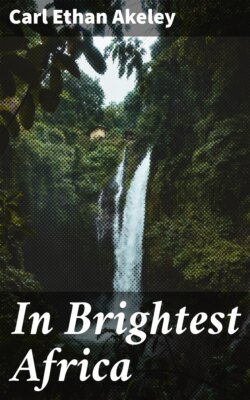Читать книгу In Brightest Africa - Carl Ethan Akeley - Страница 7
CHAPTER II ELEPHANT FRIENDS AND FOES
ОглавлениеI have sat in the top of a tree in the middle of a herd a quarter of a mile from a native village in Uganda in a last desperate effort to inspect the two hundred and fifty elephants which had been chevying me about so fast that I had not had a chance to see whether there were any desirable specimens among them or not. I have spent a day and a night in the Budongo Forest in the middle of a herd of seven hundred elephants. I have stood on an ant-hill awaiting the rush of eleven elephants which had got my wind and were determined to get me. I have spent a day following and fighting an old bull which took twenty-five shots of our elephant rifles before he succumbed. And once also I had such close contact with an old bull up on the slopes of Mt. Kenia that I had to save myself from being gored by grabbing his tusks with my hands and swinging in between them.
I have spent many months studying elephants in Africa—on the plains, in the forests, in the bamboo, up on the mountains. I have watched them in herds and singly, studied their paths, their feeding grounds, everything about them I could, and I have come to the conclusion that of all the wild animals on this earth now, the African elephant is the most fascinating, and that man, for all the thousands of years he has known of elephants, knows mighty little about him. I am speaking only of the African elephant. He has not been domesticated as his Indian cousin has. The two are different in size and different in shape and different in habits. The low point of an African elephant's back line is the highest point of that of the Indian elephant. The African elephant's ears and tusks are larger, and his tusks usually spread wider at the points instead of coming together. Unless one studies him in his native haunts, one cannot get to know him. His disposition is held to be wilder than that of the Indian elephant, but the infrequency of his appearance in circuses and in zoölogical parks may be attributed to the ease with which tamed elephants may be obtained from India rather than to a difference of temper in the two beasts. An African elephant at Washington and one in the Bronx zoölogical park are the only ones I know of in this country, and no animal in captivity can give one more than a slight idea of his natural habits in his jungle home.
Very few people have studied African elephants in the field. Ninety-five per cent. of those who have followed them have been purely hunters and their desire has been, not to study, but to shoot—to see the elephant the shortest possible time. Time to judge the ivories and get a bead on the brain was all that they wanted. Of other elephant knowledge all that they needed was the simple facts of how to follow and find them. The comparatively few men who have tried to study the elephant have not gained as much knowledge as one would imagine, because without trying it one cannot realize how extremely difficult it is to study the live African elephant.
For example, as I said before, I spent a day with seven hundred elephants in the Budongo Forest, but although I heard them all the time and was very acutely conscious that they were near me, I do not believe that I actually had my eyes on an elephant more than half an hour, all told, during the day. It happened this way.
One night about dark, after a week or two of hunting, we heard the squeal of an elephant while we were sitting at dinner. A little later there were more squeals and occasional trumpeting—more and more, clearer and clearer—and by the time we had finished dinner the noise was only a mile or so away. It was a continuous row which suggested a tremendous herd. We went to bed early with elephants getting closer to camp all of the time. There is little danger of elephants attacking a camp, and, as there is no way to study them at night, about the only thing left to do was to go to bed and get in good shape for the next day. Along about midnight Mrs. Akeley came over to my tent and said that she had loaded my guns and that they were all ready. She could not sleep; so she went out to sit by the fire. The elephants were then within a hundred yards of our tents and there was a continuous roar made up of trumpetings, squealing, and the crashing of bushes and trees.
